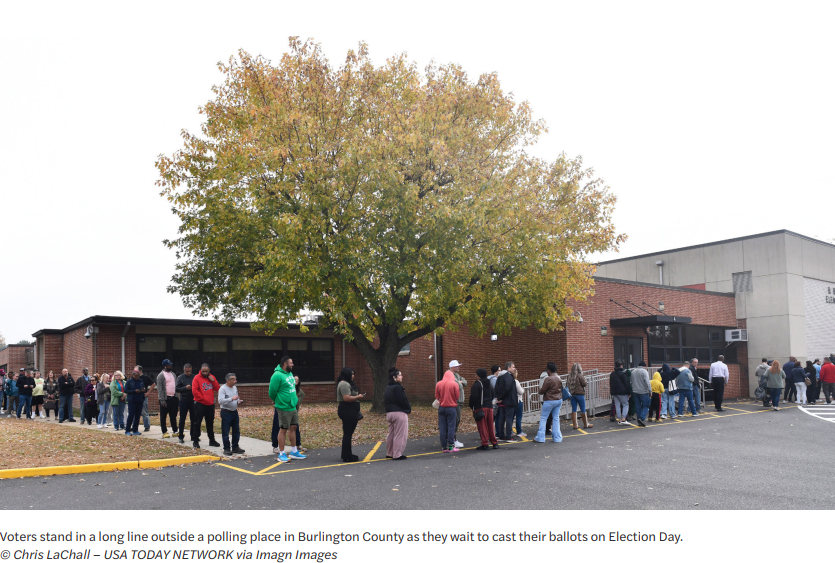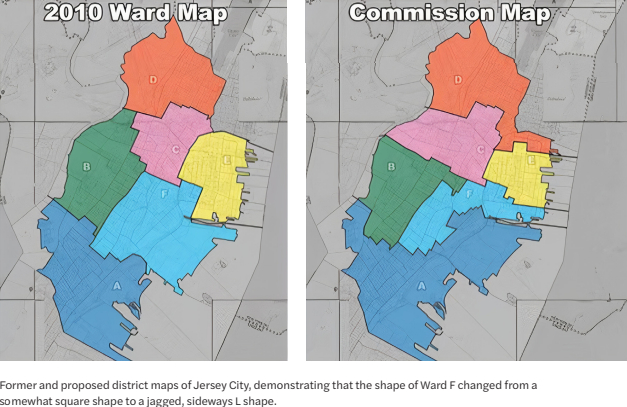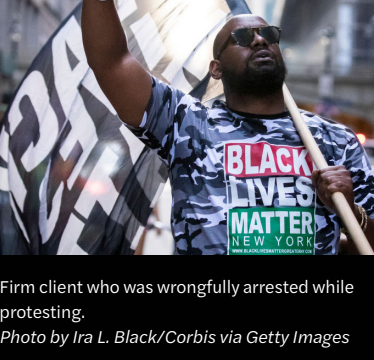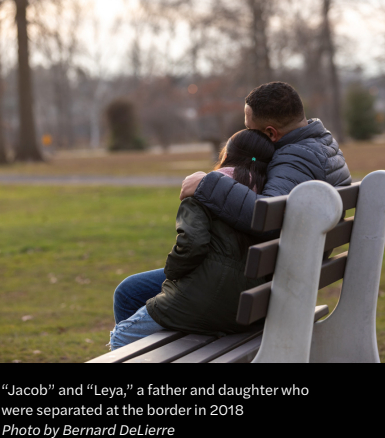Resilience
On November 5, 2024, we sat in a conference room with a team of volunteers helping resolve issues identified by voters who called into a nonpartisan voter protection hotline. We received what seemed like endless complaints from voters in Burlington County, NJ, who remained steadfast and stood in line for many hours on a dark and cold night to cast their votes, while hotline field volunteers offered reassurance, up-to-date information, and even pizza and water to help alleviate some of the discomfort and inconvenience experienced by these voters. That story has a somewhat happy ending: armed with our reports from voters, the Attorney General sued and obtained an order extending voting hours in impacted polling places so that as many eligible voters as possible could cast their ballots. This is just one of many examples of resilience that our clients, volunteer lawyers, and pro bono partners exhibit every day.
"Johnny" and "Jane" are two clients for whom we filed petitions seeking clemency under Governor Murphy's innovative categorical clemency campaign. They each received life sentences for their roles in serious crimes soon after they turned 18—far longer sentences than they would have received under today's sentencing scheme. Many people in their situation would give up and resign themselves to a lifetime of incarceration. But our clients showed astonishing grit and transformed their lives while in prison. They both obtained bachelor's degrees with highest honors and, even then, continued their education. They demonstrate that young people can change and that people need not be defined by the worst thing that they have ever done.
Our nonprofit clients inspire us too. Take Brick by Brick Training & Development Corporation, a nonprofit committed to stabilizing low- and moderate-income neighborhoods by transforming vacant and abandoned properties nationwide into affordable housing units. In recent years, we assisted Brick by Brick in a number of complex transactions that resulted in the acquisition of almost 800 properties for development into affordable housing. We also advised the organization on acquiring and rehabilitating properties damaged during Superstorm Sandy, turning loss into opportunity for communities in need. Nonprofits like Brick by Brick that work to revitalize communities demonstrate the power of resilience.
We have for years worked with a coalition of advocates to address the fact that tenants—97% of whom are unrepresented in court—are frequently evicted based on eviction complaints that do not satisfy the minimum requirements of applicable laws and court rules. Determined to improve the process, the coalition is now collaborating with the judiciary and other stakeholders on reforms that we hope will promote due process in eviction proceedings—reminding us that advocacy takes many forms and the path towards lasting change is often long and paved by many.
Our clients, colleagues in the nonprofit and legal services sectors, and volunteers are tough, and we are proud to stand with them. We draw strength from their examples, as we know we will all, inevitably, find ourselves in need of resilience at one time or another.
Alexander Shalom
Chair,
Lowenstein Center for the Public Interest
Natalie J. Kraner
Legal Director,
Lowenstein Center for the Public Interest
CIVIL RIGHTS AND LIBERTIES
Protecting the Right to Vote
The firm demonstrated its long-term commitment to ensuring that eligible voters were able to cast their ballots by once again partnering with Election Protection, the national, nonpartisan voter hotline organized by the Lawyers' Committee for Civil Rights Under Law. The firm was responsible for responding to Connecticut, New Jersey, New York, and Rhode Island voters who contacted the hotline and for reaching out to elections officials to report problems identified by those voters. On Election Day, our volunteers handled almost 1,400 interactions with voters—resolving voter issues in real time by answering questions about registration status, polling place location, and absentee ballots, among others. Volunteers also reported and helped remedy systemic issues such as machine malfunctions and extended wait times at the polls.
One example where voter reports led to meaningful change was in Burlington County, New Jersey. Throughout Election Day, volunteers received dozens of reports at several polling locations of wait times of three or more hours. In response, a team of Lowenstein volunteers, in collaboration with the ACLU of New Jersey, Disability Rights New Jersey, the League of Women Voters of New Jersey, the New Jersey Institute for Social Justice, and the Prison Legal Advocacy Network, escalated the issue to local and state officials. Armed with information from the hotline, state officials obtained a court order that extended the closing time for polling places in the county and required the distribution of emergency paper ballots, ensuring that more eligible voters had the opportunity to cast their ballots.
Our commitment to election protection extended well beyond Election Day. From our work with state and federal agencies to prepare for and resolve any issues that occurred prior to Election Day to postelection advocacy, we will continue to collaborate with our nonprofit partners to promote fair, accessible, and efficient voting processes.

Standing Up for Transgender Rights
The firm continues to stand with and support transgender people in exercising their rights to access health care and to live safely and authentically.
DOE V. LADAPO
Florida legislators passed a law that banned medical care for transgender adolescents (subject only to a narrow exception) and restricted that care for transgender adults. Along with co-counsel from GLBTQ Legal Advocates & Defenders (GLAD), Human Rights Campaign Foundation, National Center for Lesbian Rights, and Southern Legal Counsel, lawyers from Lowenstein Sandler sued to enjoin the law.
After a three-day trial in December 2023, at which plaintiffs presented extensive expert testimony demonstrating that these restrictions have no medical basis, the trial court found that the bulk of the Florida statute was motivated by disapproval of transgender people and violates the equal protection rights of transgender individuals and parents of transgender minors in Florida.
The firm continues to stand with and support transgender people in exercising their rights to access health care and to live safely and authentically
Most challenges to laws that target transgender people have relied on the theory that the laws make classifications based on gender, subjecting the laws to heightened scrutiny. But that legal approach was not available in Florida, as the U.S. Court of Appeals for the Eleventh Circuit had recently held that this sort of law did not target people on the basis of gender. As a result, Lowenstein and its co-counsel argued that Florida's law violated the Constitution because it resulted from invidious discrimination— an effort by the state of Florida to harm transgender people because they are transgender. In June 2024, the district court agreed that we had proven the law was based on hostility against transgender individuals and issued an injunction, which is a court order that stopped the law from being enforced. The state of Florida appealed that decision, and in August 2024, the Eleventh Circuit allowed the law to take effect while the appeal progresses. The appeal was argued in January 2025, and we are waiting for a decision on the merits.
UNITED STATES V. SKRMETTI
Florida was not alone in passing laws that limit the ability of transgender adolescents to access medical treatment recommended by their doctors and approved by their parents. Tennessee passed a law that banned the use of puberty blockers and hormone therapy—only when used to affirm an adolescent's gender that is inconsistent with their sex at birth. In other words, under the law, if a girl had a medical reason to delay menstruation, she could take puberty blockers, but a transgender boy who would suffer if he developed breasts could not. Advocates and the United States sued Tennessee to enjoin this ban on gender-affirming medical care.
The U.S. Supreme Court agreed to hear the case to decide whether laws like Tennessee's make gender-based classifications that require special justification. The case received significant attention—individuals and organizations filed more than 70 friend-of-the-court briefs urging the Court to decide the case one way or another.
One of the critical questions the Court had to grapple with was the extent to which this medical care was safe and effective. Proponents of the law relied on a United Kingdom study, known as the Cass Report, to argue that there was a medical basis for Tennessee's law. But there are significant flaws in the Cass Report's methodology, and even if it were sound, it did not call for a total ban on care for transgender adolescents like the challenged law did.
The firm filed a friend-of-the court brief on behalf of a group of expert researchers and physicians, who have cared for thousands of transgender youth and have published hundreds of peer-reviewed studies, detailing the reasons why the Court should not rely on the Cass Report. A decision in the case remains pending
FIGHTING AGAINST SCHOOL DISTRICT POLICIES THAT VIOLATE THE LAW AGAINST DISCRIMINATION
Most New Jersey school districts have policies in place to protect the health and safety of transgender schoolchildren. But in 2023, a few school districts changed course and adopted policies that would force school administrators to notify parents, over their child's objection, whenever their child indicated that they were transgender or gender nonconforming or asked for accommodations, such as the use of their preferred name and pronouns or to use a restroom or join a sport team or club in accordance with their gender identity.
The Attorney General, through the Division on Civil Rights, obtained a court order preventing the implementation of these forced-outing policies, which it contends violate the state's antidiscrimination law because of the differential and detrimental treatment of transgender students. The firm submitted a friend-of-the-court brief on behalf of Garden State Equality and the ACLU of New Jersey in the appellate proceedings, highlighting the harms that LGBTQ students face when they're not ready to come out or have a family that's not supportive. The brief also argued that parents do not have a constitutional right to such notification, which the districts claim in defense of their forced-outing policies. The appellate court agreed and relied on arguments made in our brief to uphold the court order preventing the implementation of the forced-outing policies.
HELPING TRANSGENDER PEOPLE NAVIGATE THE LEGAL NAME CHANGE PROCESS
Sometimes the rights of transgender people are vindicated in high-stakes arguments before appellate courts; but far more often, people just want to live their lives with dignity and authenticity. For years, Lowenstein lawyers have worked with Advocates for Trans Equality to seek name changes for indigent transgender New Jerseyans whose identification documents do not match their chosen names or gender identities. In 2024, our lawyers and staff represented 44 indigent people seeking name changes.

Advocating for Fair Voting Districts
The firm has a history of defending democracy by arguing against unconstitutional gerrymandering. In 2017, we submitted a brief in Gill v. Whitford arguing that severe partisan gerrymandering undermined the basic democratic principle that elected officials should represent and be accountable to their constituents. Similarly, in 2019, we filed briefs in Rucho v. Common Cause and Lamone v. Besinek arguing that election manipulation through partisan gerrymandering violated fundamental American democratic principles of representativeness and accountability in government.
Our commitment to ensuring fairly drawn redistricting maps continued in 2024. Jersey City is required to be organized into political subdivisions that by law must be roughly equal in size, compact, and contiguous. In the latest redistricting process, Jersey City ran afoul of these principles and created a redistricting map that transformed one district into a crescent shape and divided several historical neighborhoods, and even some residential buildings, into different districts. Community groups sued to strike the proposed map. When the case reached the New Jersey Supreme Court, on behalf of the ACLU of New Jersey, we submitted a friend-ofthe court brief in Jersey City United Against the New Ward Map v. Jersey City Ward Commission.
Our brief argued that the current redistricting map in Jersey City violates the state's Municipal Ward Law, dividing communities of interest and historical districts. The Municipal Ward Law requires ward commissioners to "fix and determine the ward boundaries so that each ward is formed of compact and contiguous territory," which did not occur here. Our brief further argued that the court should use the standard common in courts throughout the country for defining compactness of districts.
We await an opinion in this case and are hopeful that the New Jersey Supreme Court will allow for a robust remand hearing to allow plaintiffs to show that the map is insufficiently compact and unfairly divides communities, which will help restore fair voting districts in Jersey City.
Recent Civil Rights Victories
In last year's annual report, we discussed a number of civil rights cases that have since been resolved in favor of our clients. Below, we provide an update on those matters; the full write-ups on the facts and legal claims are available in the 2023 Annual Report.

VINDICATING THE RIGHT TO PROTEST
The firm obtained a substantial settlement on behalf of two Black Lives Matter activists who were wrongfully arrested in Paterson, New Jersey, in 2019 while peacefully protesting for police accountability.
PROTECTING VULNERABLE PRISONERS
The firm obtained a substantial settlement against corrections officials who failed to protect a pretrial detainee at Essex County Correctional Facility from being physically assaulted and raped by his cellmate even though the officers were aware of the daily threats of physical and sexual violence.
OBTAINING COMPENSATION FOR FORMERLY SEPARATED FAMILIES
The firm has long represented three families who sued the government for money damages under the Federal Tort Claims Act for the harms they suffered, and continue to suffer, as a result of their forced separations when they arrived at the southern border in 2018. Those cases have now settled, and the families received financial compensation for the horrific trauma they endured.

To view the full article click here
The content of this article is intended to provide a general guide to the subject matter. Specialist advice should be sought about your specific circumstances.


